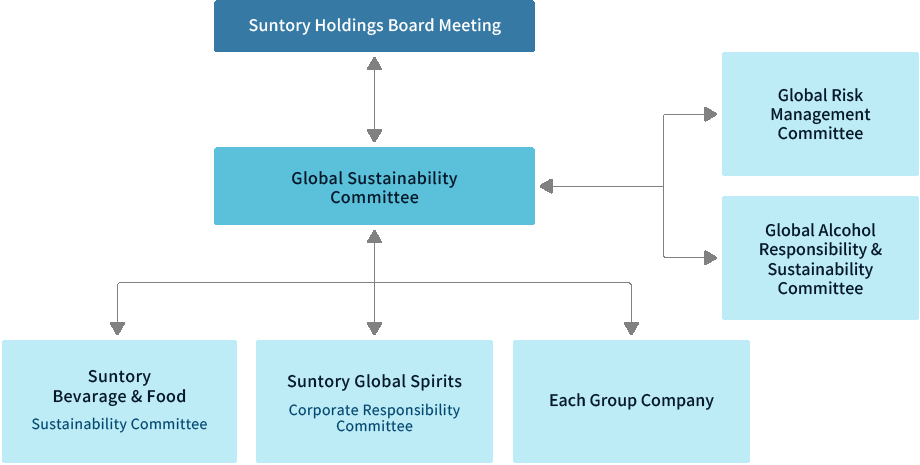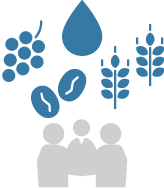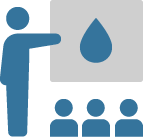Our Policies and Approach
For Suntory Group、the global environment is an essential foundation for our business. As a company dedicated to delivering the gifts of water and nature to our customers, we recognize our significant responsibility to protect ecosystems, including beautiful and clean water, and to pass on a sustainable society to future generations.
To realize a rich and sustainable society, Suntory Group committed to preserving and regenerating the natural environment and to reducing environmental impact across the entire Group. To guide these efforts, we established the Suntory Group Environmental Principles. We work collaboratively towards the realization of a sustainable society by promoting this Policy not only among our employees but also throughout the value chain, including our business partners and other stakeholders.
Suntory Group Environmental Principles
Our Environmental Principles clearly indicates our priority initiatives, such as “achieving water security,” “conserving and regenerating biodiverse ecosystems,” “promoting a circular economy,” and “transitioning to a net-zero society.” We formulate specific environmental targets and action plans based on this policy, which was established in 1997 and revised in 2022. We also emphasize communication with society and stakeholders to champion the transformation to a sustainable society.
Suntory Group Environmental Principles
At Suntory Group, environmental management is at the core of our business strategy. In our commitment to cultivating a sustainable and vibrant society now and in the future, these environmental principles inform the actions we take each day across our entire value chain.
-
1.Achieving water security
Water is the most vital resource for our business. At Suntory, we aim to become net water positive by using water carefully and localizing water stewardship to contribute to nature’s healthy water cycle. -
2.Conserving and regenerating biodiverse ecosystems
Thriving water and agricultural systems are crucial to our business. We strive to protect and regenerate biodiversity through local water source conservation and sustainable agricultural practices. -
3.Promoting a circular economy
To effectively reduce waste and efficiently utilize limited resources, we imbed sustainable principles throughout the lifecycle of our products, promote the 3Rs (reduce, reuse, recycle) for all raw materials, use renewable resources when available, and collaborate with stakeholders to build a fundamentally circular system. -
4.Transitioning to a net-zero society
In the face of climate change, we are doing our part to achieve a net-zero society by reducing greenhouse gas emissions across our value chain. -
5.Engaging with society
To achieve a vibrant global environment, we are championing the transformation to a sustainable society by collaborating with our stakeholders, deepening dialogues with local communities, and transparently disclosing our progress.
Promoting Structure
Global Sustainability Committee
The Global Sustainability Committee (GSC) is the core of our sustainability management promotion system. The Committee is chaired by the Chief Sustainability Officer, with Executive Officers from each business serving as vice chairs. Committee members include the Directors in charge of each functional division, the heads of Group companies from around the world, and the heads of functional divisions.
The GSC discusses the Group’s sustainability strategies and confirms progress on priority themes (water, climate action, raw ingredients, containers and packaging, health and human rights). Progress on environmental and social activities as well as business risks and opportunities are reported to the Board of Directors on a quarterly basis. In addition, the Board of Directors are provided with the opportunities to hear advice from third party experts on sustainability management. Additionally, the targets used to determine executive compensation include a sustainability component.
Suntory Group's Environmental Management Promoting Structure

Environmental Policy Implementation Structure
To implement our Environmental Principles, each Group company appoints an environmental management officer, while designated personnel at each business site manage daily compliance and environmental performance. This includes strict internal standards for wastewater and air emissions. In the event of a serious environmental accident or regulatory violation, there is a system in place for immediate reporting to management. As of 2024, we have had no major environmental incidents.
Environmental Management System (ISO14001)
We have also introduced ISO14001–based environmental management systems at our major production sites in Japan and overseas, checking its effectiveness through periodic internal audits and third-party certification. Suntory Group companies in Japan*1 have ISO integrated certification. Our small-scale sites have been exempt from certification since 2017 but instead have strengthened compliance management and transitioned to more efficient operations. Each business division works together under this structure to promote environmental considerations throughout the entire value chain.
- *1Group companies complying to the Japanese SOX Act
Targets and Progress
Suntory Group has established Environmental Targets toward 2030 in addition to our long-term Environmental Vision toward 2050, covering water and climate action, which are expected to have a particularly large impact on our business operations among sustainability issues. We have also set goals for containers and packaging toward 2030 and are currently taking action accordingly.
Mid- to Long-term Goals

-
*1Suntory Group plants that manufactures finished products
-
*2Reduction per unit production based on the business fields in 2015
-
*3Coffee, barley, grapes
-
*4Based on emissions in 2019
-
*5Percentage of sustainable materials (e.g., recycled or bio-based materials) in terms of PET bottle weight.
Progress
| Materiality | 2030 targets | 2024 results | |
|---|---|---|---|
| Water |
Reduction of water used in direct operation |
Reduce the water intensity of production at our owned plants*1 by 35%*2 globally. In addition, explore reduction of absolute amount of water withdrawn in highly water stressed areas |
|
Water replenishment |
Replenish more than 100% of water used in at least 50% of our owned plants*1 globally, including all those in highly water stressed areas, through local water source conservation efforts. Especially in regions with high water stress, the above initiatives are implemented at all plants. |
|
|
Sustainable water use in raw ingredients |
Collaborate with suppliers to improve water-use efficiency in the production of water-intensive key ingredients*3 in highly water stressed areas. |
|
|
Water education and access to safe water |
Expand water education programs and initiatives to provide safe water access for more than 5 million people. |
|
|
| Climate action |
Scope 1,2

|
Reduce GHG emissions from our direct operations by 50%*4 |
|
Scope 1,2,3

|
Reduce GHG emissions across our entire value chain by 30%*4 |
|
|
| Containers and packaging |
Use of Sustainable Materials in PET Bottles |
100% of PET bottles made with sustainable materials (globally) |
|
-
*1Suntory Group plants that manufactures finished products
-
*2Reduction of water intensity of production based on 2015 baseline year
-
*3Coffee beans, barley, grapes
-
*4Based on emissions in 2019.
-
*5Percentage of sustainable materials (e.g., recycled or bio-based materials) in terms of PET bottle weight.
Our Initiatives
Reducing Environmental Impact Across the Product Life Cycle
Suntory Group generates various by-products and waste from a wide range of business activities. We are committed to reducing environmental impact by quantitatively understanding our impact on the environment throughout a product's life cycle - from planning and development to disposal and recycling.
In addition, following the global expansion of our business, we assess the environmental impact of production sites around the world to determine the environmental impact on a global scale. To reduce environmental impact across the supply chain, we encourage our business partners, including suppliers who do business with the Suntory Group, to disclose environmental information and take action to reduce their environmental impact.
This comprehensive approach has helped us achieve ongoing reductions in GHG emissions and water usage intensity for each of our products.

Compliance with Environmental Regulations and Voluntary Standards
In addition to complying with environmental laws and regulations (such as the Act on Promotion of Global Warming Countermeasures and the Energy Conservation Act in Japan), each Suntory Group plant is committed to environmental management by setting voluntary standards for wastewater treatment, boiler facilities and other environmental facilities that are equal to or more stringent than those set by laws and regulations.
In 2024, no serious accidents or violations affecting environmental pollution occurred.
Should a problem be found, we thoroughly investigate the cause and take measures to prevent a recurrence, sharing our findings with the entire Group.
Approach for Internal Awareness-Raising
To deepen employees' environmental awareness and understanding of sustainability, and to cultivate talent capable of taking proactive steps towards a sustainable society, we are engaging in systematic awareness-raising activities. Suntory Group conducts an annual sustainability-themed e-learning program for all employees, providing an opportunity to learn about the societal challenges facing our business and the initiatives we are undertaking.
In fiscal 2024, we conducted educational training (such as e-learning) on sustainable management for Group employees in Japan, with a total of 21,237 employees participating. We are also expanding our online training programs and e-learning courses to Group employees worldwide. In addition, we regularly hold specialized training sessions tailored to specific roles and job level, such as seminars on environmental regulations for factory personnel and LCA workshops for product development teams to help employees acquire the skills necessary for each area of work.

Seminar on managing Wastes Disposal and Public Cleansing Act
For more information on environmental training attendance, see Performance Data.
First Hand Experience with Forestry at Suntory Natural Water Sanctuary
We are advancing employee forestry volunteer activity at our Suntory Natural Water Sanctuaries. Up until 2013, many employees and their families joined these activities as volunteers.
Since 2014, the program has evolved into a forest maintenance experience aimed at helping each employee personally understand and embody Suntory Group’s corporate philosophy. More than 12,000 employees in alcoholic and non-alcoholic businesses have participated so far. This training is currently included in the onboarding program for new employee.

Forestry maintenance training for employees
Green Bonds
Suntory Group is actively engaging in sustainable finance to realize a decarbonized society and water usage preservation. Based on our 2022 Sustainable Finance Framework, Suntory Holdings Limited issued a green bond, a type of SDG bond, with proceeds to be used for projects that contribute to solving environmental issues.
